Nurturing of Soul Through Faith: Spirituality in Healthcare
VerifiedAdded on 2021/04/17
|6
|1426
|244
Essay
AI Summary
This essay explores the significance of faith and spirituality in healthcare, focusing on the author's personal journey and professional aspirations. The author discusses the Daniel Plan's principles, emphasizing the importance of faith in achieving a healthy lifestyle. The essay delves into the historical context of spirituality, highlighting its essence and relevance in patient care. It emphasizes the benefits of spiritual care, including improved patient outcomes and enhanced coping mechanisms. The author advocates for natural spirituality, emphasizing self-reflection and personal development, and discusses the positive effects of spirituality on mental and physical well-being. The essay concludes by stressing the importance of integrating spiritual care for vulnerable populations and developing a holistic approach to patient care, considering the calming effect of spirituality on various aspects of patient well-being.
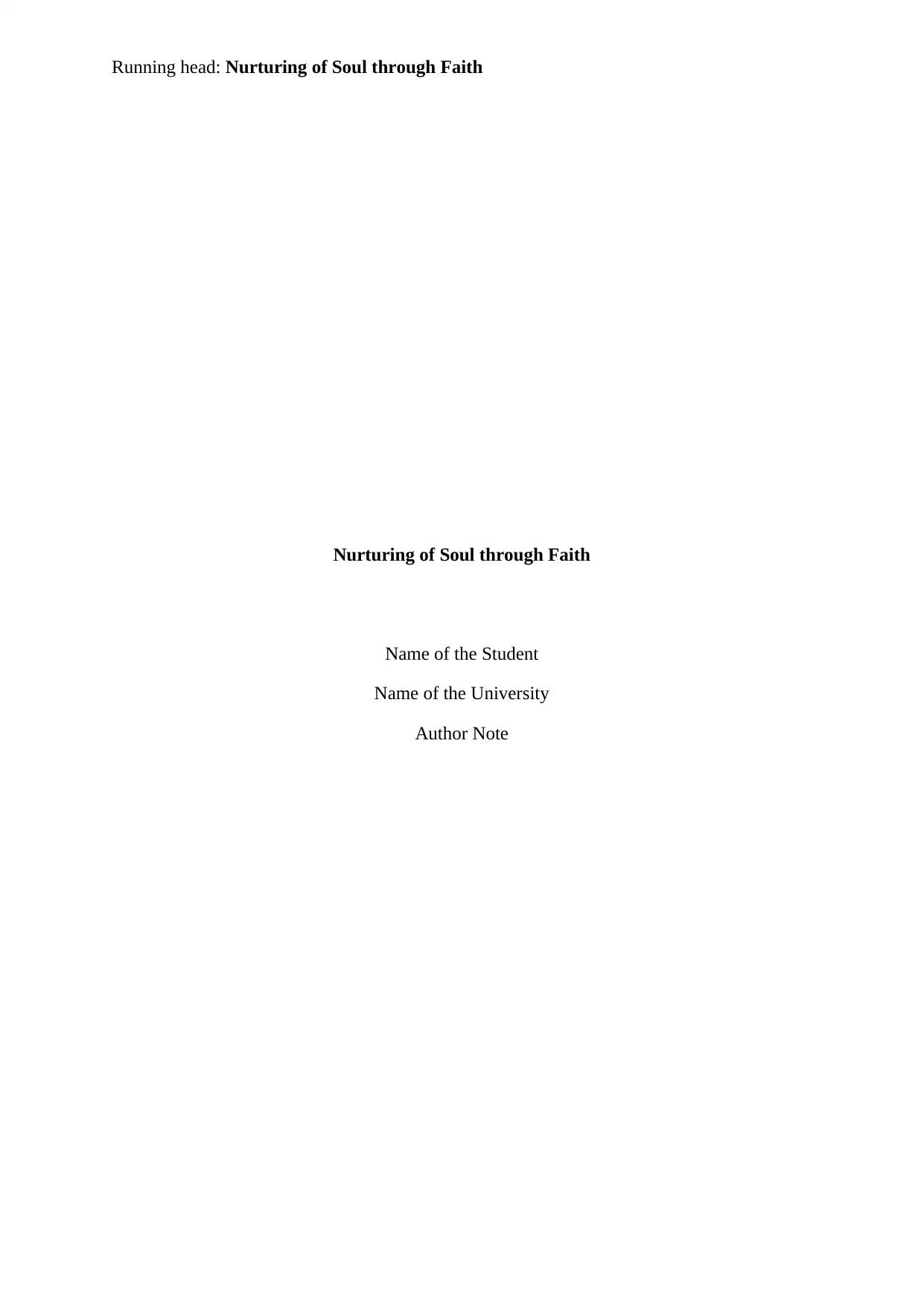
Running head: Nurturing of Soul through Faith
Nurturing of Soul through Faith
Name of the Student
Name of the University
Author Note
Nurturing of Soul through Faith
Name of the Student
Name of the University
Author Note
Paraphrase This Document
Need a fresh take? Get an instant paraphrase of this document with our AI Paraphraser
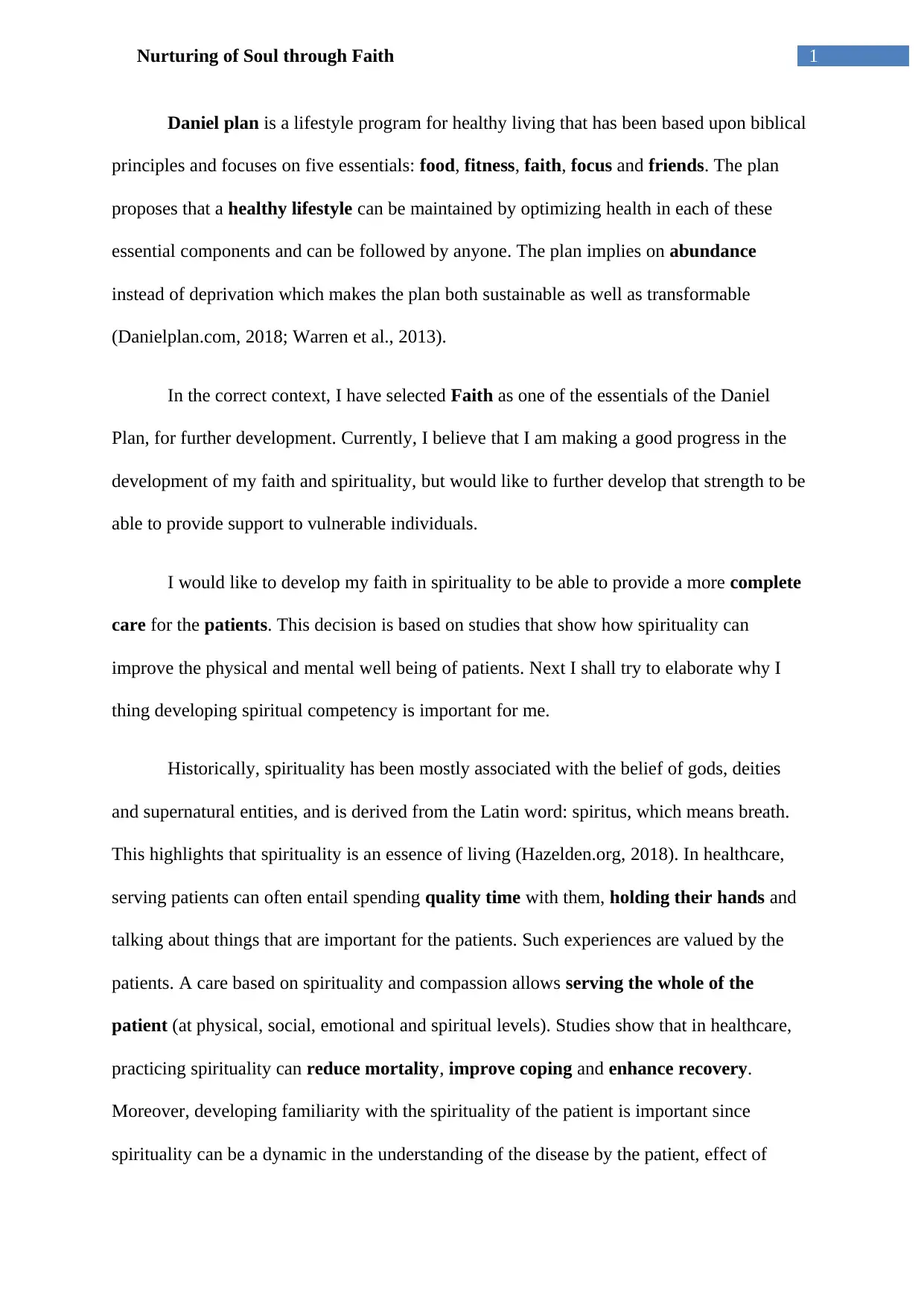
1Nurturing of Soul through Faith
Daniel plan is a lifestyle program for healthy living that has been based upon biblical
principles and focuses on five essentials: food, fitness, faith, focus and friends. The plan
proposes that a healthy lifestyle can be maintained by optimizing health in each of these
essential components and can be followed by anyone. The plan implies on abundance
instead of deprivation which makes the plan both sustainable as well as transformable
(Danielplan.com, 2018; Warren et al., 2013).
In the correct context, I have selected Faith as one of the essentials of the Daniel
Plan, for further development. Currently, I believe that I am making a good progress in the
development of my faith and spirituality, but would like to further develop that strength to be
able to provide support to vulnerable individuals.
I would like to develop my faith in spirituality to be able to provide a more complete
care for the patients. This decision is based on studies that show how spirituality can
improve the physical and mental well being of patients. Next I shall try to elaborate why I
thing developing spiritual competency is important for me.
Historically, spirituality has been mostly associated with the belief of gods, deities
and supernatural entities, and is derived from the Latin word: spiritus, which means breath.
This highlights that spirituality is an essence of living (Hazelden.org, 2018). In healthcare,
serving patients can often entail spending quality time with them, holding their hands and
talking about things that are important for the patients. Such experiences are valued by the
patients. A care based on spirituality and compassion allows serving the whole of the
patient (at physical, social, emotional and spiritual levels). Studies show that in healthcare,
practicing spirituality can reduce mortality, improve coping and enhance recovery.
Moreover, developing familiarity with the spirituality of the patient is important since
spirituality can be a dynamic in the understanding of the disease by the patient, effect of
Daniel plan is a lifestyle program for healthy living that has been based upon biblical
principles and focuses on five essentials: food, fitness, faith, focus and friends. The plan
proposes that a healthy lifestyle can be maintained by optimizing health in each of these
essential components and can be followed by anyone. The plan implies on abundance
instead of deprivation which makes the plan both sustainable as well as transformable
(Danielplan.com, 2018; Warren et al., 2013).
In the correct context, I have selected Faith as one of the essentials of the Daniel
Plan, for further development. Currently, I believe that I am making a good progress in the
development of my faith and spirituality, but would like to further develop that strength to be
able to provide support to vulnerable individuals.
I would like to develop my faith in spirituality to be able to provide a more complete
care for the patients. This decision is based on studies that show how spirituality can
improve the physical and mental well being of patients. Next I shall try to elaborate why I
thing developing spiritual competency is important for me.
Historically, spirituality has been mostly associated with the belief of gods, deities
and supernatural entities, and is derived from the Latin word: spiritus, which means breath.
This highlights that spirituality is an essence of living (Hazelden.org, 2018). In healthcare,
serving patients can often entail spending quality time with them, holding their hands and
talking about things that are important for the patients. Such experiences are valued by the
patients. A care based on spirituality and compassion allows serving the whole of the
patient (at physical, social, emotional and spiritual levels). Studies show that in healthcare,
practicing spirituality can reduce mortality, improve coping and enhance recovery.
Moreover, developing familiarity with the spirituality of the patient is important since
spirituality can be a dynamic in the understanding of the disease by the patient, effect of
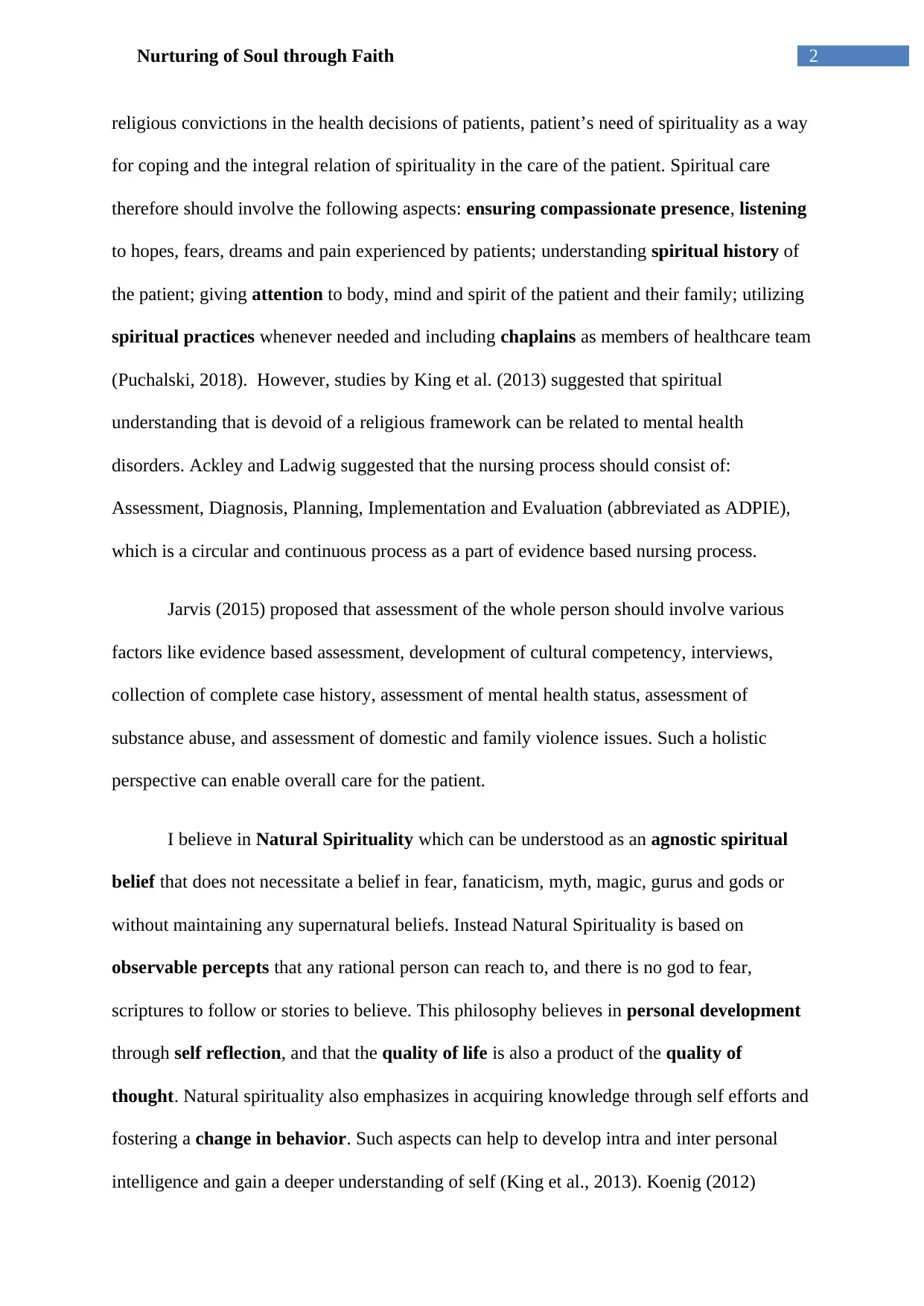
2Nurturing of Soul through Faith
religious convictions in the health decisions of patients, patient’s need of spirituality as a way
for coping and the integral relation of spirituality in the care of the patient. Spiritual care
therefore should involve the following aspects: ensuring compassionate presence, listening
to hopes, fears, dreams and pain experienced by patients; understanding spiritual history of
the patient; giving attention to body, mind and spirit of the patient and their family; utilizing
spiritual practices whenever needed and including chaplains as members of healthcare team
(Puchalski, 2018). However, studies by King et al. (2013) suggested that spiritual
understanding that is devoid of a religious framework can be related to mental health
disorders. Ackley and Ladwig suggested that the nursing process should consist of:
Assessment, Diagnosis, Planning, Implementation and Evaluation (abbreviated as ADPIE),
which is a circular and continuous process as a part of evidence based nursing process.
Jarvis (2015) proposed that assessment of the whole person should involve various
factors like evidence based assessment, development of cultural competency, interviews,
collection of complete case history, assessment of mental health status, assessment of
substance abuse, and assessment of domestic and family violence issues. Such a holistic
perspective can enable overall care for the patient.
I believe in Natural Spirituality which can be understood as an agnostic spiritual
belief that does not necessitate a belief in fear, fanaticism, myth, magic, gurus and gods or
without maintaining any supernatural beliefs. Instead Natural Spirituality is based on
observable percepts that any rational person can reach to, and there is no god to fear,
scriptures to follow or stories to believe. This philosophy believes in personal development
through self reflection, and that the quality of life is also a product of the quality of
thought. Natural spirituality also emphasizes in acquiring knowledge through self efforts and
fostering a change in behavior. Such aspects can help to develop intra and inter personal
intelligence and gain a deeper understanding of self (King et al., 2013). Koenig (2012)
religious convictions in the health decisions of patients, patient’s need of spirituality as a way
for coping and the integral relation of spirituality in the care of the patient. Spiritual care
therefore should involve the following aspects: ensuring compassionate presence, listening
to hopes, fears, dreams and pain experienced by patients; understanding spiritual history of
the patient; giving attention to body, mind and spirit of the patient and their family; utilizing
spiritual practices whenever needed and including chaplains as members of healthcare team
(Puchalski, 2018). However, studies by King et al. (2013) suggested that spiritual
understanding that is devoid of a religious framework can be related to mental health
disorders. Ackley and Ladwig suggested that the nursing process should consist of:
Assessment, Diagnosis, Planning, Implementation and Evaluation (abbreviated as ADPIE),
which is a circular and continuous process as a part of evidence based nursing process.
Jarvis (2015) proposed that assessment of the whole person should involve various
factors like evidence based assessment, development of cultural competency, interviews,
collection of complete case history, assessment of mental health status, assessment of
substance abuse, and assessment of domestic and family violence issues. Such a holistic
perspective can enable overall care for the patient.
I believe in Natural Spirituality which can be understood as an agnostic spiritual
belief that does not necessitate a belief in fear, fanaticism, myth, magic, gurus and gods or
without maintaining any supernatural beliefs. Instead Natural Spirituality is based on
observable percepts that any rational person can reach to, and there is no god to fear,
scriptures to follow or stories to believe. This philosophy believes in personal development
through self reflection, and that the quality of life is also a product of the quality of
thought. Natural spirituality also emphasizes in acquiring knowledge through self efforts and
fostering a change in behavior. Such aspects can help to develop intra and inter personal
intelligence and gain a deeper understanding of self (King et al., 2013). Koenig (2012)
⊘ This is a preview!⊘
Do you want full access?
Subscribe today to unlock all pages.

Trusted by 1+ million students worldwide
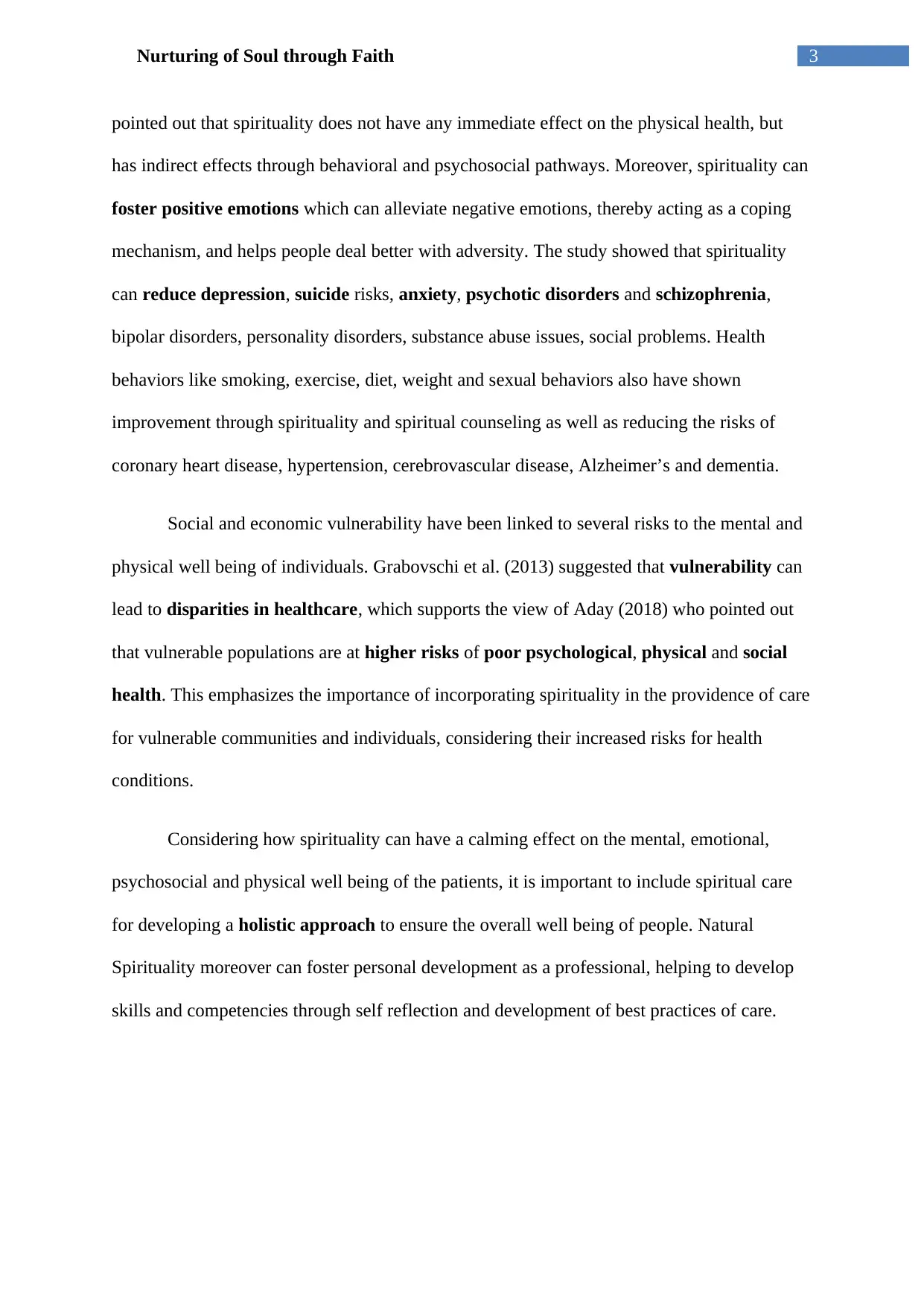
3Nurturing of Soul through Faith
pointed out that spirituality does not have any immediate effect on the physical health, but
has indirect effects through behavioral and psychosocial pathways. Moreover, spirituality can
foster positive emotions which can alleviate negative emotions, thereby acting as a coping
mechanism, and helps people deal better with adversity. The study showed that spirituality
can reduce depression, suicide risks, anxiety, psychotic disorders and schizophrenia,
bipolar disorders, personality disorders, substance abuse issues, social problems. Health
behaviors like smoking, exercise, diet, weight and sexual behaviors also have shown
improvement through spirituality and spiritual counseling as well as reducing the risks of
coronary heart disease, hypertension, cerebrovascular disease, Alzheimer’s and dementia.
Social and economic vulnerability have been linked to several risks to the mental and
physical well being of individuals. Grabovschi et al. (2013) suggested that vulnerability can
lead to disparities in healthcare, which supports the view of Aday (2018) who pointed out
that vulnerable populations are at higher risks of poor psychological, physical and social
health. This emphasizes the importance of incorporating spirituality in the providence of care
for vulnerable communities and individuals, considering their increased risks for health
conditions.
Considering how spirituality can have a calming effect on the mental, emotional,
psychosocial and physical well being of the patients, it is important to include spiritual care
for developing a holistic approach to ensure the overall well being of people. Natural
Spirituality moreover can foster personal development as a professional, helping to develop
skills and competencies through self reflection and development of best practices of care.
pointed out that spirituality does not have any immediate effect on the physical health, but
has indirect effects through behavioral and psychosocial pathways. Moreover, spirituality can
foster positive emotions which can alleviate negative emotions, thereby acting as a coping
mechanism, and helps people deal better with adversity. The study showed that spirituality
can reduce depression, suicide risks, anxiety, psychotic disorders and schizophrenia,
bipolar disorders, personality disorders, substance abuse issues, social problems. Health
behaviors like smoking, exercise, diet, weight and sexual behaviors also have shown
improvement through spirituality and spiritual counseling as well as reducing the risks of
coronary heart disease, hypertension, cerebrovascular disease, Alzheimer’s and dementia.
Social and economic vulnerability have been linked to several risks to the mental and
physical well being of individuals. Grabovschi et al. (2013) suggested that vulnerability can
lead to disparities in healthcare, which supports the view of Aday (2018) who pointed out
that vulnerable populations are at higher risks of poor psychological, physical and social
health. This emphasizes the importance of incorporating spirituality in the providence of care
for vulnerable communities and individuals, considering their increased risks for health
conditions.
Considering how spirituality can have a calming effect on the mental, emotional,
psychosocial and physical well being of the patients, it is important to include spiritual care
for developing a holistic approach to ensure the overall well being of people. Natural
Spirituality moreover can foster personal development as a professional, helping to develop
skills and competencies through self reflection and development of best practices of care.
Paraphrase This Document
Need a fresh take? Get an instant paraphrase of this document with our AI Paraphraser
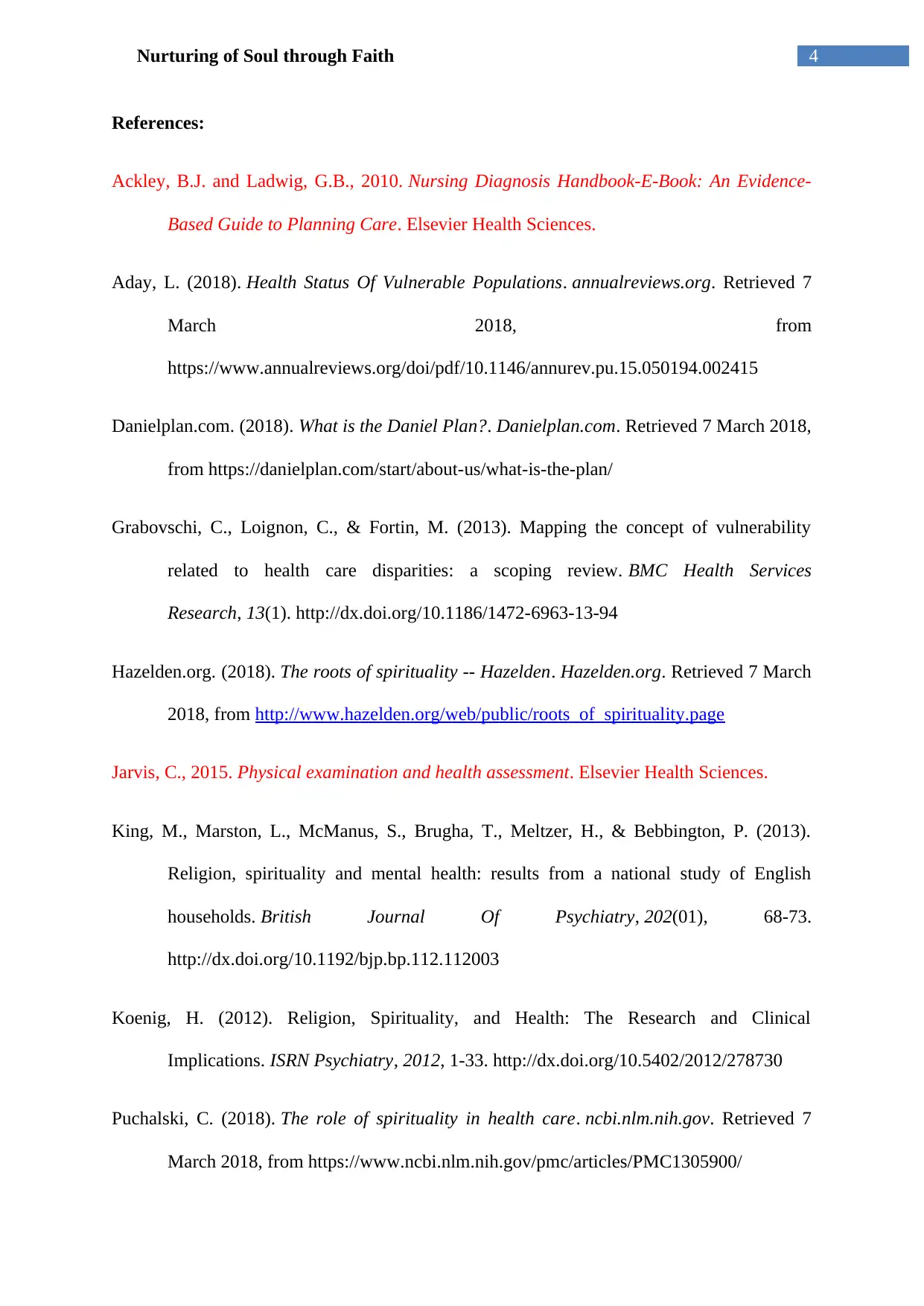
4Nurturing of Soul through Faith
References:
Ackley, B.J. and Ladwig, G.B., 2010. Nursing Diagnosis Handbook-E-Book: An Evidence-
Based Guide to Planning Care. Elsevier Health Sciences.
Aday, L. (2018). Health Status Of Vulnerable Populations. annualreviews.org. Retrieved 7
March 2018, from
https://www.annualreviews.org/doi/pdf/10.1146/annurev.pu.15.050194.002415
Danielplan.com. (2018). What is the Daniel Plan?. Danielplan.com. Retrieved 7 March 2018,
from https://danielplan.com/start/about-us/what-is-the-plan/
Grabovschi, C., Loignon, C., & Fortin, M. (2013). Mapping the concept of vulnerability
related to health care disparities: a scoping review. BMC Health Services
Research, 13(1). http://dx.doi.org/10.1186/1472-6963-13-94
Hazelden.org. (2018). The roots of spirituality -- Hazelden. Hazelden.org. Retrieved 7 March
2018, from http://www.hazelden.org/web/public/roots_of_spirituality.page
Jarvis, C., 2015. Physical examination and health assessment. Elsevier Health Sciences.
King, M., Marston, L., McManus, S., Brugha, T., Meltzer, H., & Bebbington, P. (2013).
Religion, spirituality and mental health: results from a national study of English
households. British Journal Of Psychiatry, 202(01), 68-73.
http://dx.doi.org/10.1192/bjp.bp.112.112003
Koenig, H. (2012). Religion, Spirituality, and Health: The Research and Clinical
Implications. ISRN Psychiatry, 2012, 1-33. http://dx.doi.org/10.5402/2012/278730
Puchalski, C. (2018). The role of spirituality in health care. ncbi.nlm.nih.gov. Retrieved 7
March 2018, from https://www.ncbi.nlm.nih.gov/pmc/articles/PMC1305900/
References:
Ackley, B.J. and Ladwig, G.B., 2010. Nursing Diagnosis Handbook-E-Book: An Evidence-
Based Guide to Planning Care. Elsevier Health Sciences.
Aday, L. (2018). Health Status Of Vulnerable Populations. annualreviews.org. Retrieved 7
March 2018, from
https://www.annualreviews.org/doi/pdf/10.1146/annurev.pu.15.050194.002415
Danielplan.com. (2018). What is the Daniel Plan?. Danielplan.com. Retrieved 7 March 2018,
from https://danielplan.com/start/about-us/what-is-the-plan/
Grabovschi, C., Loignon, C., & Fortin, M. (2013). Mapping the concept of vulnerability
related to health care disparities: a scoping review. BMC Health Services
Research, 13(1). http://dx.doi.org/10.1186/1472-6963-13-94
Hazelden.org. (2018). The roots of spirituality -- Hazelden. Hazelden.org. Retrieved 7 March
2018, from http://www.hazelden.org/web/public/roots_of_spirituality.page
Jarvis, C., 2015. Physical examination and health assessment. Elsevier Health Sciences.
King, M., Marston, L., McManus, S., Brugha, T., Meltzer, H., & Bebbington, P. (2013).
Religion, spirituality and mental health: results from a national study of English
households. British Journal Of Psychiatry, 202(01), 68-73.
http://dx.doi.org/10.1192/bjp.bp.112.112003
Koenig, H. (2012). Religion, Spirituality, and Health: The Research and Clinical
Implications. ISRN Psychiatry, 2012, 1-33. http://dx.doi.org/10.5402/2012/278730
Puchalski, C. (2018). The role of spirituality in health care. ncbi.nlm.nih.gov. Retrieved 7
March 2018, from https://www.ncbi.nlm.nih.gov/pmc/articles/PMC1305900/
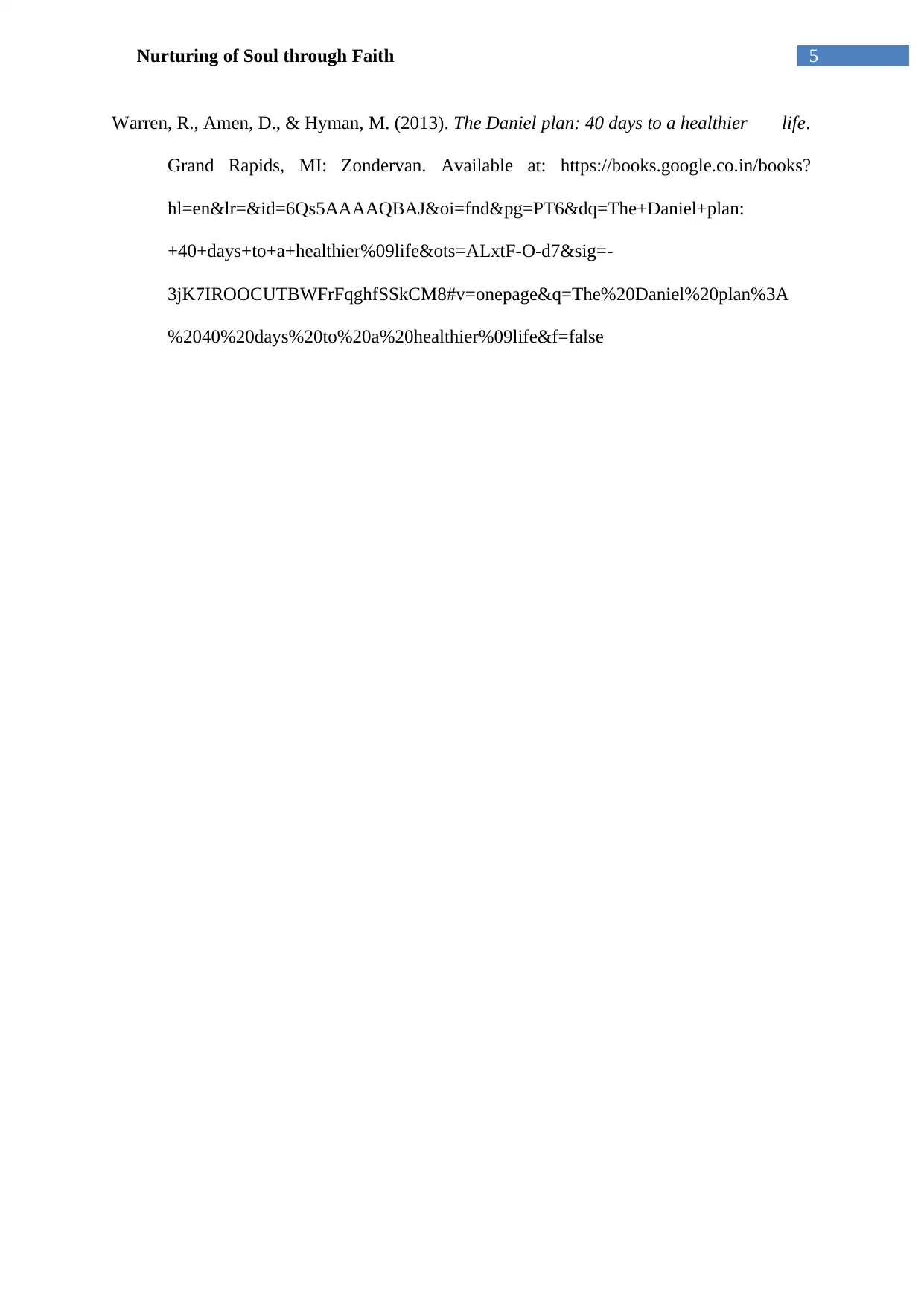
5Nurturing of Soul through Faith
Warren, R., Amen, D., & Hyman, M. (2013). The Daniel plan: 40 days to a healthier life.
Grand Rapids, MI: Zondervan. Available at: https://books.google.co.in/books?
hl=en&lr=&id=6Qs5AAAAQBAJ&oi=fnd&pg=PT6&dq=The+Daniel+plan:
+40+days+to+a+healthier%09life&ots=ALxtF-O-d7&sig=-
3jK7IROOCUTBWFrFqghfSSkCM8#v=onepage&q=The%20Daniel%20plan%3A
%2040%20days%20to%20a%20healthier%09life&f=false
Warren, R., Amen, D., & Hyman, M. (2013). The Daniel plan: 40 days to a healthier life.
Grand Rapids, MI: Zondervan. Available at: https://books.google.co.in/books?
hl=en&lr=&id=6Qs5AAAAQBAJ&oi=fnd&pg=PT6&dq=The+Daniel+plan:
+40+days+to+a+healthier%09life&ots=ALxtF-O-d7&sig=-
3jK7IROOCUTBWFrFqghfSSkCM8#v=onepage&q=The%20Daniel%20plan%3A
%2040%20days%20to%20a%20healthier%09life&f=false
⊘ This is a preview!⊘
Do you want full access?
Subscribe today to unlock all pages.

Trusted by 1+ million students worldwide
1 out of 6
Related Documents
Your All-in-One AI-Powered Toolkit for Academic Success.
+13062052269
info@desklib.com
Available 24*7 on WhatsApp / Email
![[object Object]](/_next/static/media/star-bottom.7253800d.svg)
Unlock your academic potential
Copyright © 2020–2025 A2Z Services. All Rights Reserved. Developed and managed by ZUCOL.





